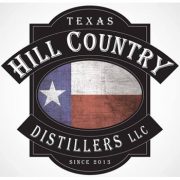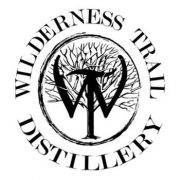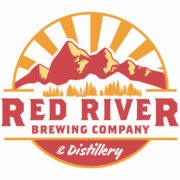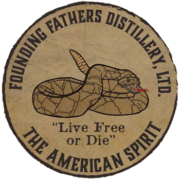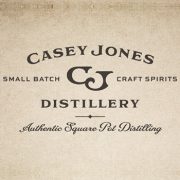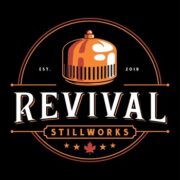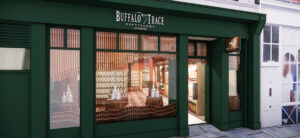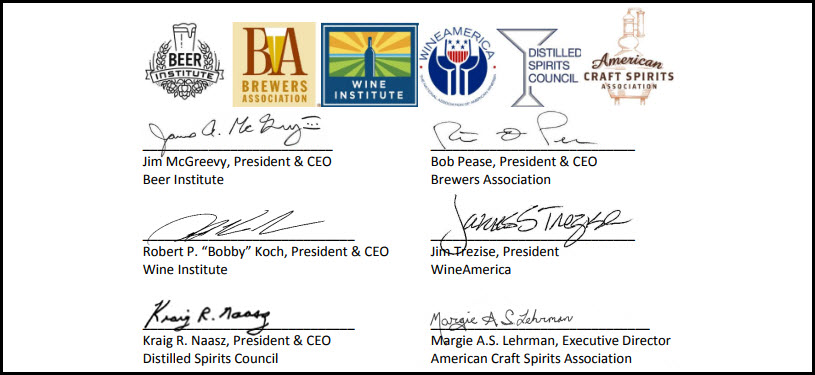
The American Craft Spirits Association (ACSA) and the Distilled Spirits Council of the United States (DISCUS) have both issued statements commending Senate Finance Committee Chairman Orrin Hatch for including a provision for Federal Excise Tax reduction in his markup of the tax reform proposal.
ACSA and DISCUS members have lobbied to support the tax cut legislation in an alcohol producers coalition that includes Beer Institute, Brewers Association, Wine Institute and Wine America. This latest amendment includes a modest two year version of Senate bill S. 236 the Craft Beverage Modernization and Tax Reform Act.
The statement reads in part, “The excise tax and regulatory reform embodied in Portman Amendment #1 supports businesses of many shapes and sizes, both small and large. The broad, bipartisan, bicameral showing of support for this bill signifies how important excise tax reform is to many in Congress. We strongly support Portman Amendment #1 and urge you to include it in your Manager’s Amendment that is slated for consideration this week.” You can read the entire joint statement of support for the Portman Amendment #1 in a letter signed by all six organizations here.
Portman Amendment #1 Makes it into Markup – Moves Forward
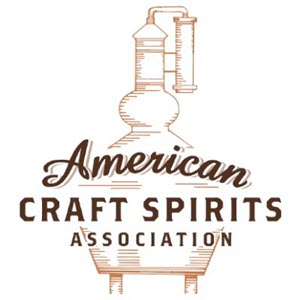
Mark Schilling, President of the American Craft Spirits Association said, “The Senate committee will consider the bill with the addition of several amendments agreed to by Chairman Hatch, the excise tax reduction being one.” Schilling added, “Process wise, it is likely to be voted out of committee this week and have a full Senate vote just after Thanksgiving. After that the House and Senate Committees will sit down together to reconcile the difference between the two versions.”
54% of Every Distilled Spirits Bottle Goes to Tax and Fees
The current Federal Excise Tax (FET) levied on distilled spirits is $13.50 per proof gallon, and the distilled spirits sector paid over $5.5 billion in FET in 2016 alone. This is a unique and excessive tax burden on the industry.
The Craft Beverage Modernization and Tax Reform Act, S.236 and companion HR 747 bill introduced by Representatives Erik Paulsen (R-MN-03) and Ron Kind (D-WI-03) and Senators Ron Wyden (D-OR) and Roy Blunt (R-MO) creates a more fair and equitable tax structure for brewers, winemakers, distillers and importers of all beverage alcohol.
Fifty-four percent of the price of a typical bottle of distilled spirits is consumed by taxes and fees.
This bill proposes to reform the federal excise tax on spirits by:
- Establishing a reduced rate of $2.70 per proof gallon for the first 100,000 proof gallons of distilled spirits produced or imported annually for spirits.
- Establishing a rate of $13.34 per proof gallon for the next 22,130,000 proof gallons of distilled spirits.
- Keeping the excise tax rate of $13.50 per proof gallon for production in excess of 22,230,000 proof gallons.
These rates would apply to both domestic producers and importers of distilled spirits, regardless of size, and would mark the first time that taxes on distilled spirits were reduced since the Civil War.
Stay Informed: Sign up here for the Distillery Trail free email newsletter and be the first to get all the latest news, trends, job listings and events in your inbox.
Craft Spirits Distilleries Represent Entrepreneurs & Small Business
The craft distilling industry is growing, with, on average, one distillery opening per day. There are craft spirits distilleries operating in the U.S. in all 50 states, employing close to 20,000 people. Investments in the industry in the last decade have now reached over $600 million, according to the Craft Spirits Data Project (2017).
“The resurgence of craft distilling over the last fifteen or so years has been tremendous, and fair tax treatment will ensure we have opportunity to compete, not just in our local communities, but in the global market as well,” said Mark Shilling. “In an competitive global economy, we are an industry that is proudly bringing manufacturing back to America, creating jobs, growing tourism, supporting local farmers and other small businesses, and Federal Excise Tax reduction is paramount to continuing to allow us to do just that.”
Margie A.S. Lehrman, Executive Director of ACSA, added, “The burdensome Federal Excise Tax is a substantial impediment to economic growth in the craft spirits industry, but this bipartisan commitment to ‘fixing’ this injustice is promising. The Congress understands the reinvestment opportunities, allowing craft spirits producers the chance to expand their production capacity, add new jobs, and expand their tourism and tasting room facilities. This is a clear “win” for American economic growth.”
Bi-Partisan Support for Craft Spirits Tax Reform Growing
The industry is closer than ever to FET reform. Support both in the House of Representatives and in the Senate continues to grow. House bill HR 747 has reached 297 co-sponsors and the companion bill in the Senate S.236 is now up to 55 co-sponsors.
Don’t slow down, continue to contact your Senator and Congressman to urge support for this major tax reform bill.
Here’s the mark up language for the bill.
DESCRIPTION OF THE CHAIRMAN’S MODIFICATION
TO THE CHAIRMAN’S MARK OF
THE “TAX CUTS AND JOBS ACT”
November 14, 2017
8. Reduced excise tax rates on distilled spirits (Page 89)
Present Law
An excise tax is imposed on all distilled spirits produced in, or imported into, the United States.237 The tax liability legally comes into existence the moment the alcohol is produced or imported but payment of the tax is not required until a subsequent withdrawal or removal from the distillery, or, in the case of an imported product, from customs custody or bond.238
Distilled spirits are taxed at a rate of $13.50 per proof gallon.239 Liability for the excise tax on distilled spirits comes into existence when the alcohol is produced but is not determined and payable until bottled distilled spirits are removed from the bonded premises of the distilled spirits plant where they are produced. Generally, bulk distilled spirits may be transferred in bond between bonded premises; however, tax liability follows these products. Imported bulk distilled
spirits may be released from customs custody without payment of tax and transferred in bond to a distillery. Distilled spirits be exported without payment of tax and may be withdrawn without payment of tax or free of tax from the production facility for certain authorized uses, including industrial uses and non-beverage uses.
A portion of the revenues from the distilled spirits excise tax imposed on rum imported or brought into240 the United States (less certain administrative costs) is transferred (“covered over”) to Puerto Rico and the U.S. Virgin Islands.241 The amount covered over is $10.50 per proof gallon ($13.25 per proof gallon during the period from July 1, 1999, through December 31, 2016).
Eligible distilled spirits wholesale distributors and distillers receive an income tax credit for the average cost of carrying previously imposed excise tax on beverages stored in their warehouses.242
Description of Proposal
The proposal institutes a tiered rate for distilled spirits. The rate of tax is lowered to $2.70 per proof gallon on the first 100,000 proof gallons of distilled spirits, $13.34 for all proof gallons in excess of that amount but below 22,130,000 proof gallons, and $13.50 for amounts thereafter. The proposal contains rules so as to prevent members of the same controlled group from receiving the lower rate on more than 100,000 proof gallons of distilled spirits. Importers of distilled spirits are eligible for the lower rates.
The proposal expires for taxable years beginning after December 31, 2019.
Effective Date
The proposal applies to distilled spirits removed after December 31, 2017.
237: Secs. 5001 (distilled spirits), 5041 (wines), and 5051 (beer). 238: Secs. 5006, 5043, and 5054. In general, proprietors of distilled spirit plants, proprietors of bonded wine cellars, brewers, and importers are liable for the tax. 239: A “proof gallon” is a U.S. liquid gallon of proof spirits, or the alcoholic equivalent thereof. Generally a proof gallon is a U.S. liquid gallon consisting of 50 percent alcohol. On lesser quantities, the tax is paid proportionately. Credits are allowed for wine content and flavors content of distilled spirits. Sec. 5010. 240: Because Puerto Rico is inside U.S. customs territory, articles entering the United States from that commonwealth are “brought into” rather than “imported into” the U.S. 241: Sec. 7652. 242: Sec. 5011. Section 5011 is administered and enforced by the IRS.
Stay tuned folks, this is a big, big deal!
Related Stories
Craft Spirits Makers Need to Seize the Day – Tell Your Senator to Support Tax Amendment “Portman #1”
Craft Spirits Makers 2017 D.C. Fly-In to Support Craft Beverage Modernization & Tax Reform [Agenda]
Virginia Distillers Association in D.C. to Support Craft Beverage Modernization & Tax Reform
HR 747 Craft Beverage Modernization & Tax Reform Reaches Majority in House
Craft Beverage Modernization & Tax Reform Act to Help Beer, Cider, Wine & Distilled Spirits Industries
Please help to support Distillery Trail. Sign up for our Newsletter, like us on Facebook and follow us on Twitter.

